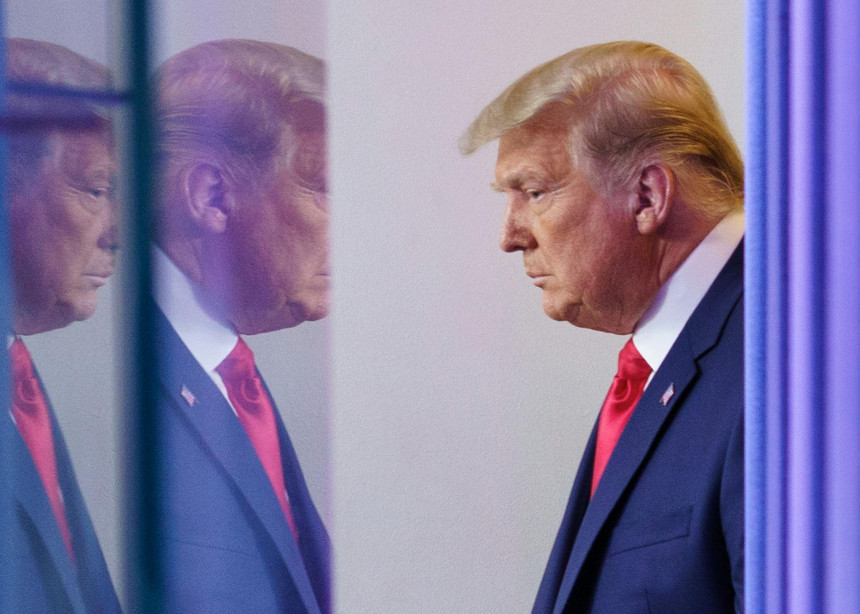Donald Trump has been forced to resign in the fight against Deep State

Although the proceedings over the results of the US presidential election on November 3 are still ongoing and are likely to continue for a long time to come, it is now clear that everything is largely over - on January 20, the United States will have a new 46th President, Joe Biden.
Trump himself also seems to have come to terms with the loss and, by allowing funds to be allocated to the presidency transition process, has implicitly acknowledged Biden's victory. This means that fears that Trump would not simply leave the White House in the event of a loss and will call on his supporters to go out in streets, thus threatening civil war, have been exaggerated. It must be said that even beyond that, judging by what is happening (at least for the time being), the transit of power takes place in the most peaceful way possible, when taking into account Trump's personality and previous statements.
The acclaimed US political institutions, or as Trump himself called them, the Deep State, proved to be stronger than Trump's stubbornness, obstinacy, and inordinate self-confidence. Biden's actual dominance, on the other hand, turned out to be greater than one might have initially thought. In Michigan, it was 150,000 votes, in Pennsylvania - 80,000, in Wisconsin - 20,000, and in other states where Trump is trying to challenge the election results, the dominance is in the thousands. At the same time, there is no convincing, fact-based evidence that the election results had been falsified somewhere. If there are any errors and inconsistencies, then they are isolated cases, but, as I said, Biden's advantage is so big that these individual cases cannot change the overall results.
Trump's own fate is shrouded in mystery. The Deep State threatens to take revenge for daring to stand "perpendicular" to their interests, and accusations are already being made against Trump, which could even send the former US president to prison. Trump's position in the Republican Party itself is not really clear either. On one hand, he has gained immense popularity among the "common people" with his direct language and opposition to Washington's plankton - this Deep State. Republicans need this popularity as much as they need to eat, and polls show that it was thanks to Trump that Republicans managed to maintain their dominance in the Senate and reduce their distance from Democrats in the House of Representatives. Trump's narcissism, shamelessness, demonstrative non-intelligence, disregard for facts and elementary logic, on the other hand, are repulsive to a part of the party that is close to the same Deep State that Trump fought so hard. Consequently, the attitude of the Republican Party towards its current leader will largely depend on whether Trump will maintain his popularity even after he is no longer president and loses this aura of influence.
Meanwhile, Biden is already forming his next team, and it is made up of old, long-tested Deep State employees. For Latvia (from the US foreign policy point of view), the positions of the Secretary of State (Minister of Foreign Affairs) and the National Security Adviser are the most important in this team. Antony Blinken and Jacob Jeremiah Sullivan have been selected for these positions. Given that Blinken's grandfather was a Jew born in Kiev and he himself lived in Paris for many years (and is fluent in French), the new Secretary of State will have a completely different view of Europe, Russia and the United States' place in the world. He rather watches European football (soccer) than American football, and his favorite band is Pink Floyd.
If during Trump (Pompeo) the US interest in events not directly related to the US was minimal, then a new boom in transatlantic relations can now be expected. From this point of view, Putin and especially Lukashenko are unlikely to be happy about the changes in the White House. As for Sullivan, he, like Blinken, worked with Biden while he was still vice president of the Obama administration. He is a relatively young politician. Tomorrow, November 28, he will turn 44 and is projected to have a brilliant career. Including the possibility to one day become the resident of the White House.
The team also includes the Secretary of State during Obama presidency John Kerry, who will become the main coordinator on all climate issues. Given Kerry's toothlessness when he was the chief US foreign policy spokesman, his nomination may be disappointing for those hoping for a particular breakthrough on climate change. On the other hand, such people who always look at which way the wind is blowing often show a special zeal when it is expected of them by a crowd of enthusiastic supporters, so anything could happen.
Much will be written about Biden's new administration, and by January 20, a lot may change in the distribution of positions. In any case, one thing can be said for sure - the new US administration will be much more world-oriented than Trump's "America first" administration. I think that can only be a good thing for Latvia.
